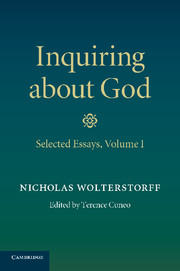Book contents
- Frontmatter
- Contents
- Editor's introduction
- Acknowledgments
- Introduction
- 1 Analytic philosophy of religion: retrospect and prospect
- 2 Is it possible and desirable for theologians to recover from Kant?
- 3 Conundrums in Kant's rational religion
- 4 In defense of Gaunilo's defense of the fool
- 5 Divine simplicity
- 6 Alston on Aquinas on theological predication
- 7 God everlasting
- 8 Unqualified divine temporality
- 9 Suffering love
- 10 Is God disturbed by what transpires in human affairs?
- 11 The silence of the God who speaks
- 12 Barth on evil
- 13 Tertullian's enduring question
- Bibliography
- Index
12 - Barth on evil
Published online by Cambridge University Press: 04 May 2010
- Frontmatter
- Contents
- Editor's introduction
- Acknowledgments
- Introduction
- 1 Analytic philosophy of religion: retrospect and prospect
- 2 Is it possible and desirable for theologians to recover from Kant?
- 3 Conundrums in Kant's rational religion
- 4 In defense of Gaunilo's defense of the fool
- 5 Divine simplicity
- 6 Alston on Aquinas on theological predication
- 7 God everlasting
- 8 Unqualified divine temporality
- 9 Suffering love
- 10 Is God disturbed by what transpires in human affairs?
- 11 The silence of the God who speaks
- 12 Barth on evil
- 13 Tertullian's enduring question
- Bibliography
- Index
Summary
Though Karl Barth has much to say about evil, he does not aim to explain evil. Explanation, he says, is impossible; evil is “necessarily incomprehensible and inexplicable to us as human beings.” Working as a Christian theologian whose thought is firmly grounded in the Scriptures, he develops instead a theological framework for thinking and speaking about evil. The development, extraordinarily rich, and as difficult and expansive as it is rich, occurs in the third part of the third volume of his Church Dogmatics, this being the volume in which he develops the doctrine of creation.
Having devoted §49 of III/3 to a discussion of providence, under its three aspects of preservation, accompaniment, and rule, he then opens the following section thus:
There is opposition and resistance to God's world-dominion. There is in world-occurrence an element, indeed an entire sinister system of elements, which is not comprehended by God's providence in the sense thus far described, and which is not therefore preserved, accompanied, nor ruled by the almighty action of God like creaturely occurrence … There is amongst the objects of God's providence an alien factor. It cannot escape God's providence but is comprehended by it. The manner, however, in which this is done is highly peculiar in accordance with the particular nature of this factor … The result is that the alien factor can never be considered or mentioned together in the same context as other objects of God's providence. Thus the whole doctrine of God's providence must be investigated afresh. […]
- Type
- Chapter
- Information
- Inquiring about God , pp. 255 - 282Publisher: Cambridge University PressPrint publication year: 2010



